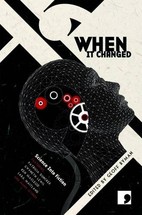 |
| Trade paperback, 276 pages Published 2009 Acquired August 2012 Read August 2016 |
edited by Geoff Ryman
Geoff Ryman edits an anthology that pairs science fiction writers with scientists: the sf writers provide stories based on real scientific concepts (sometimes loosely interpreted) and the scientists then provide a 2-3 page commentary on the story. Like any original anthology, it's a little uneven, and I found myself a bit disappointed that there weren't any particularly standout stories here. But still, there were some of note:
"Global Collider Generation: an Idyll" by Paul Cornell is a bit weird, a tale of a scientist trying to build a particle collider with the circumference of the Earth, and a mercenary trying to stop her, all in the midst of Cold War II. I don't know what to make of its assertion that direct conflict is needed for real progress. I'd hope not, but I suspect Paul Cornell actually hopes not too!
"Moss Witch" by Sara Maitland is kind of not a story, but more an examination of a hominid life-form with the traits of mosses. It made me wish I paid more attention to my botanist wife when she talks about plant reproduction, but when I wasn't lost in the details of plantdom, I enjoyed its conceit.
"You" by Geoff Ryman had a really neat idea, an idea so neat it seems like Ryman missed it. People in the future can lifeblog, go into the recorded lives of others. But you can go ever further than that: this story is about you lifeblogging someone who researched the life of someone by lifeblogging. Whoa! I'd've liked to have seen more of this, as this sort of layering was the best part of a tale of someone uncovering evidence there may have been life on Mars.
"In The Event Of" by Michael Arditti might cover some old ground as far as clone stories go, but I found it to be well-told and enjoyable regardless. What would it be like to be the clone of your parents' first child, who never lived up to her potential? Sibling-based imposter syndrome to the max!
"Zoology" by Simon Ings barely even used its scientific innovation, which I think is sort of implicitly acknowledged by Dr Matthew Cobb in "Exceptions," the story's afterword, but I mostly enjoyed it for its satire of the big and small issues of academia, from campus master plans to how rooms get renumbered in old buildings!
There weren't any bad stories here, either, but I wanted to love this book more than I did. I don't know if the premise of the book prevented the imagination from being as opened up as much as you might hope, or what, but these stories don't seem to quite live up to Ryman's hope in the introduction, that good science in fiction can create new and better ways of thinking. It's an overly ambitious goal, and perhaps the failure to realize that goal (he disparages the science and thus the imagination of the Battlestar Galactica reboot, but I'd say that Battlestar is as good as most of what's here, if not better) is what prevented this book from really succeeding for me.
No comments:
Post a Comment